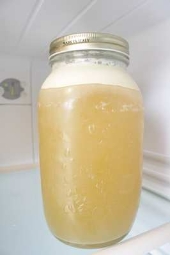




LivingWind wrote:
Well I eat some raw milk and raw honey each day anyway so I guess I'm doin fine. The drink sounds just 'okay'.. I'll take a pass. Kombucha on the other hand can be tasty at times.

LivingWind wrote:
I think I'd rather just eat some quality yogurt honestly. This doesn't look terribly good, even though it may be good for you..
 , it certainly doesn't taste bad. Much higher pro biotic qualities then yogurt, very usefull in strengthening the immune systems after anti biotic s or illness. Anyway i just thought id share it with you guys i thought someone might be interested in this recipe and possibly find this usefull, love to hear feed back from someone who has actully made it...
, it certainly doesn't taste bad. Much higher pro biotic qualities then yogurt, very usefull in strengthening the immune systems after anti biotic s or illness. Anyway i just thought id share it with you guys i thought someone might be interested in this recipe and possibly find this usefull, love to hear feed back from someone who has actully made it... 


pubwvj wrote:
What non-loggers fail to understand on forestry is that the low grade wood pays over the course of decades to manage the forests so that high grade wood can be harvested later. Making paper, wood chips, pellets all uses the low grade wood. The even smaller particles are left in the forest floor. The action of the skidders and dragging logs stirs up the forest floor litter which is a good thing as it promotes growth. All of this is assuming a sustainable long term forest farm. Farming is the ultimate in long term cropping. We do sustainable forestry as part of our farm.
The best carbon sequestering for wood happens when the logs are made into furniture, lumber for home building and other durable goods. That keeps the carbon out of the cycle longer - decades to centuries.
I have read that our forests are soaking up 1.4 tons to 2.6 tons of carbon a year. They also take in a lot of dust, smog and other pollutants produced by the cities as well as providing beautiful views and attracting the tourists during fall foliage season.
All that said, the fields being grazed by livestock are even better at soaking up carbon AND nitrogen. We apply no fertilizers yet our fields are gradually improving in fertility over the years because we carefully plant legumes and the livestock are spreading manure and urine. Inputs come in the form of the whey and other 'waste products' we get to feed our livestock. We buy and feed no grains and use virtually no petroleum - about 100 hours a year on the tractor which is fairly small.
The reason pastures do better when grazed is that the grazing knocks the plants back to a higher growth rate stage instead of letting them go into the dormant seed stage so early. Careful management of the fields through manged intensive rotational grazing makes this work very well.
Despite the fact that the fields can sequester carbon faster I would not want to have just fields. The mix of forests and fields is idea. It is along the margins where the greatest biodiversity occurs.
Cheers
-Walter
Sugar Mountain Farm
Pastured Pigs, Sheep & Kids
in the mountains of Vermont
Read about our on-farm butcher shop project:
http://SugarMtnFarm.com/butchershop
http://SugarMtnFarm.com/csa

LivingWind wrote:
Yeah, one big gotdamn racket I tell ya. I really like the idea of collectively greening the desert in western Australia to combat the rest of the world's doing... It would take years and years, and much petrol power to do it, but it sure is an intriguing endeavor.


